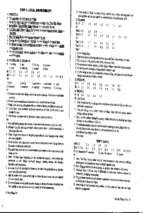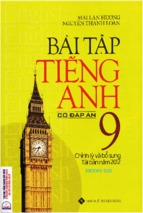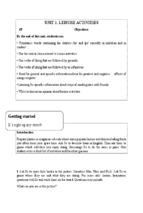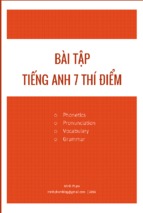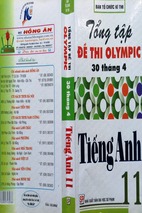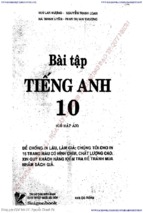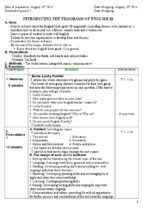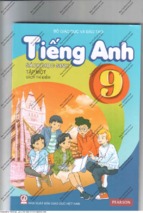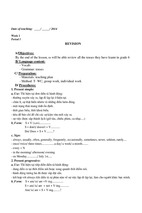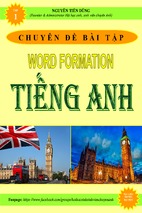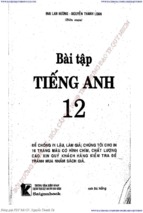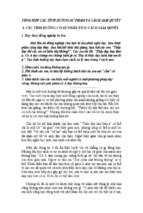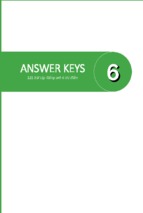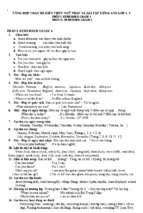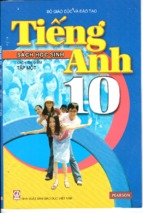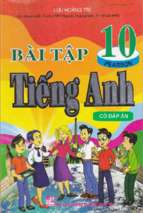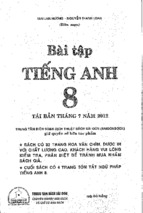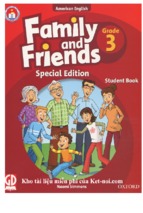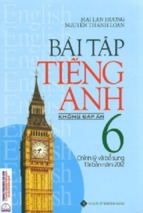KẾ HOẠCH BỒI GIỎI
MÔN: ANH VĂN 8
NĂM HỌC: 2008-2009
I. Đặc điểm tình hình:
Học sinh
Khối 6: 5 lớp
Khối 7: 4 lớp
Khối 8: 2 lớp
Khối 9: 2 lớp
Giáo viên: TS giáo viên Anh Văn 05.
1. Thuận lợi: Giáo viên trong tổ đều có trình độ đạt chuẩn và trên chuẩn.
- Giáo viên nhiệt tình.
- Thư viện có sách tham khảo, thuận lợi cho việc đọc và mở rộng kiến thức cho học sinh
và giáo viên.
- Được sự giúp đỡ quan tâm chỉ đạo của BGH.
2. Khó khăn: Trình độ học sinh còn hạn chế.
- Điều kiện học tập của các em còn thiếu thốn, ý thức học sinh học tập chưa cao.
- Phụ huynh ít quan tâm.
- Số học sinh khá giỏi không nhiều.
II. Chỉ tiêu:
- Phấn đấu vòng trường đạt 2 học sinh, vòng huỵện đạt 1 học sinh, vòng tỉnh đạt 1 học
sinh.
III. Biện pháp thực hiện:
-
Căn cứ học lực ở cuối năm học trước và kết quả khảo sát chất lượng đầu năm để chọn
những học sinh khá giỏi để bồi dưỡng.
Cho bài tập nâng cao mỗi tuần 1 buổi dạy tại nhà hoặc ở trường.
Phải thường xuyên xem sách tham khảo hoặc sách nâng cao.
Cho các em giải lại các đề thi của những năm học trước.
Thường xuyên nhắc nhở các em đi học đều đặn.
Kết hợp với phụ huynh quan tâm, nhắc nhở động viên để các em học tốt lại càng tốt
hơn.
1
Period 1
Preparing date: 23/9/2012
Teaching date: 30/9/2012
REVIEW :TENSES
1.Present simple tense:
2.Present progressive tense:
3. Future simple tense:
* Practice: I. Give the correct form of the verbs in the blankets:
1. Vegetarians (not eat) ……………………………………… meat.
2. What………………… you (do) ……………………………………… every night? – I
(go) ………………………………………to my aunt’s house.
3. He (listen) ……………………………………… to music after school.
4. Most rivers (flow) ……………………………………… into the sea.
5. My father sometimes (buy) ……………………………………… vegetables at this
market.
6. They (go) ……………………………………… fishing on Sunday.
7. Water (boil) ………………………………….....… 1000C.
II. Put the words or phrases in the correct order to make meaningful sentences:
1. marbles/ boys/ often/ the/ recess/ play/ at/
do? .......................................................................................
2. never/ my/ can/ meal/ a/ cook/ good/
sister. ............................................................................................
3. Phong/ interested/ is/ in/ always/ music.
.........................................................................................
IV. Read the passage and answer the questions below:
When I was twelve, my family moved to the city. At first, everything was strange and
difficult to me. Life in the city is always busy and the people are often in a hurry. Lots of
bikes, motorbikes, cars and buses coming from every direction scared me. Now I get
used to the life in the city. I am used to the noise and busy city traffic. I’m no longer
afraid of crossing the road. However, I don’t really like to live in the city. I prefer to live
in the countryside.
Questions:
1. Where did his family move?
................................................................................................................
2. Was everything difficult or easy to him at
first?.....................................................................................
2
3. What does he think about the city life and the city
people? ...................................................................
4. What did he hate most about the city?
.....................................................................................................
5. How is he now?
.............................................................................................................................
.........
6. Does he live in the
cities?.......................................................................................................................
V. DO EXERCISES
Period 2
Preparing date: 06/9/2012
Teaching date: 13/9/2012
REVIEW TENSES AND - SUGGESTIONS
1. Simple past tense
2. The suggestions:
Would you like + to- V..
What about + V-
?
ing...?
Shall we/ Why don’t you
Let’s +V1…
+V1 …?
Would you like to play
What about playing
Why don’t you relax?
Let’s go
chess?
chess?
- Good idea.
swimming
- I’d love to
*Practice:
– OK.
.- Great.
I. Match the sentences in column A with the ones in column B:
A
B
1. Shall we go out for dinner tonight? a. That’s very kind of you.
2. Is 8.am OK?
b. Why don’t you listen to music?
3. Can I speak to Nam, please?
c. Certainly.
4. Let me help you do the house.
d. Oh. I’d love to. I like pop music.
5. What about watching video?
e. Good idea. I’m hungry now.
6. I’m bored.
f. I’d love to. But I can’t go out at night.
7. Let’s go to the cafeteria!
g. Yes, that’s fine.
8. Would you like to listen to music? h. Oh, no. I don’t really like watching it.
Keys
123456783
II. Give the correct form of the verbs in the blankets:
1. My father (listen) ………………………………… to the radio last night.
2. Mr. Tan (not go) ………………………………… to work yesterday.
3. Mr. Nam (not work) …………………………………………… last Sunday.
4. My mother (arrive) ………………………………… home 3 day ago.
5. The students (not, be) …………………………………………… in class when I
came.
6. She (stay) ………………………………… at home and did nothing.
7. ……………… you (watch) ………………………………… a soccer match on TV
last night?.
8. Look! Mr. Nam (talk) …………………………………………… to Ba. He (teach)
………………………………… math at this school in 1986.
III. Complete the dialogue between you and Lan:
Lan: Would you like to go to the movie with me?
You:................................................................................................................................
Lan: What a pity! How about tomorrow night?
You:................................................................................................................................
Lan: Is 6:00 OK? The film starts at 7:00.
You:................................................................................................................................
Lan: I’ll pick you up. See you tomorrow.
You:................................................................................................................................
IV. DO EXERCISES
Period 3
Preparing date: 13/9/2012
Teaching date: 20/9/2012
REVIEW ON TENSES AND MODALS
1. Future simple tense (S +will + V1)
2. Intended future: (S+ am / is / are + going to +V1)
3. Modals: must - have to - ought to - used to
I must take some
pills from the
doctor.
I have to go to the
bank to get some
money.
You ought to
apologize him
My father used to go
fishing when he was
young
4
*Practice:
I. Fill in the blanks with modals: must - have to - ought to - used to
1. You....................................... wash your hands before meals.
2. It’s too late. I....................................... go now.
3. She gets bad marks at chemistry. She .......................................study harder.
4. The traffic lights are red. You .......................................stop.
5. He....................................... smoke 20 cigarettes a day, but now he doesn’t.
6. Children....................................... drink a lot of milk.
7. He has two modern cars. He....................................... be rich.
8. My eyes are weak. I....................................... wear glasses.
II. Give the correct tenses of the verbs in brackets:
2. I’m sorry you’re leaving. I hope you ….……..…………………………… (come)
back and (see) ….……..…………………………… us soon
3. I think she (buy) ….……..……………………………a new dress for her next
birthday.
4. The ambulance is coming. I (wave) ….……..…………………………… to the driver.
5. Where ….……..…………we (spend) ….……..………… the night tonight? – I think
we (come) ….…….………………… to the festival.
6. My friends (get) ….……..……………………………married in August this year.
7. ….……..……………………………You (invite) ….……..
……………………………the newcomers of our class to the party?
8. There are many clouds in the sky. It (rain) ….……..……………………………
III. Read the passage and answer the following questions:
My aunt Nhan is an actress. She must be at least thirty-five. However, she often
appears on the stage as a young girl. Nhan will have to take part in a new play soon. This
time she will be a girl of seventeen. In the play, she must appear in a bright red dress and
long black stockings. Last year in another play, she had to wear short socks and a bright,
orange-colored dress. If anyone asks her how old she is, she always answers, “My dear, it
must be terrible to grow up”.
1. What does your Tan
do?....................................................................................................................
2. How old is
she?.................................................................................................................................
3. When will Nhan have to take part in a new
play?.............................................................................
4. What did she have to wear in another play last
year?.......................................................................
V. DO EXERCISES
5
Week 8
Preparing date: 30/9/08
Teaching date: 7/10/08
TT DUYỆT
REVIEW TENSES AND PAST HABITS
1. Present progressive tense: (S+ am /is /are + V—ing).
2. A past habit: S + used to + V1. / S + didn’t use to + V1./ Did + S + use to + V1?
3. A present habit: S + am/ is / are / get(s) used to + V-ing.
4. Comparatives: S +V+ adj _er + than + S2 / S +V+ more + adj+ than + S2.
* Practice:
I. Give the correct form of the verbs in the blankets:
1. The Moon (move) ………………………………….....…. around the Earth.
2. The children (play) ………………………………….....…. in the park at the moment.
3. My mother (cook) ………………………………….....…. a meal now.
4. Be careful! The bus (come) ………………………………….....…..
5. My friend (get) ………………………………….....…. married in August this year.
6. She (visit) ………………………………….....…. Hue this summer vacation.
7. What…………………. your mother (do) ………………………………….....…. now?
8. He used to (swim) ………………………………….....…. in this river.
9. I am used to (cook) ………………………………….....…. at home.
10. Are you used to (get) ………………………………….....…. up early?
II. Complete the sentences comparatives:
1. Lan/ pretty/ her mother...........................................................................................................................
2. This pen/ expensive/ that pen.................................................................................................................
3. Those apples/ delicious/ these ................................................................................................................
4. Ms Hoa / attractive / Mr. Lan..................................................................................................................
5. This pen / good / that pen........................................................................................................................
III. Choose and underline the best answers:
1. The weather is warm enough for us ………………………………….....…. (going out- to go out- go
out- goes out)
2. The earth the Earth, the Sun, and the Moon are ……………………………….....…. (objects –
planets – friends – things)
3. They always help their mother ………………………………….....….the house work. (do –to do doing – done)
4. I………………………………….....….very happy on my last vacation. ( am –is – was – were)
5.
Ba’s brother ………………………………….....….volleyball at the moment. ( will play - plays is playing -played )
6.
Where …………………...….you ……………….....…., Nam? ( will...go – are...going – did...go –
were ... go)
7.
He ………………………………….....….some souvenirs for her friends 5 days ago. (buys bought -buy - will buy)
6
IV. Rewrite these sentences, keeping the original meaning:
1. My house is bigger than your house.
Your house is......................................................................................................................................
2. The black car is cheaper than the red car.
The red car .........................................................................................................................................
3. This film is more interesting than that one.
That film is ..........................................................................................................................................
V. Answer the questions below:
1. Did you use to go with your mother to the market when you were a kid?...........................................
2. What did you use to do last summer?..................................................................................................
3. Are you used to cooking at home? ......................................................................................................
4. What are you used to doing on Sunday mornings? .............................................................................
V. DO EXERCISES
Week 9
TT DUYỆT
Preparing date: 7/10/08
Teaching date: 14/10/08
REVIEW : COMMANDS, REQUESTS AND INVITATIONS
1. Commands, requests and invitations:
Commands (Caâu meänh leänh)
Requesst (Caâu yeâu caàu)
Yeâu caàu hay ra leänh ai laøm
- Yeâu caàu ai laøm vieäc gì ñoù cho
gì.
mình.
Baét ñaàu laø ñoäng töø nguyeân “Can/could/ may /might you...?”
maåu.
- Ñeà nghò, xin pheùp laøm 1 vieäc gì
ÔÛ PÑ baét ñaàu laø Don’t +
ñoù.
V1.
“Can/could/ may /might I...?”
- Go to the black board.
- Don’t talk in the class.
Invitations (Caâu môøi)
- Môøi 1 ngöôøi khaùc duøng moät
thöù gì.
“Will you have/ Would you like..?”
- Môøi 1 ngöôøi thöïc hieän vieäc gì.
“Will/ would/ could you...? “
“Would you like to ...?”
- Can you lend me some money?
- Could I take photographs here?
- Will you have some tea?- Yes,
please.
- Would you like to go now?- I’d love
to.
2. Superlatives: S + V + the adj –est + n. / S + V + The most + adj + n.
*Practice:
I. Arrange the words given into correct sentences: (Saép xeáp caùc cuïm töø sau theo traät töï ñuùng)
1. would/ you/ to/ go/ the/ like / the movies/ tonight?....................................................................................
2. you / wait / could / a / for / moment?.........................................................................................................
3. listen / don’t / him / to.............................................................................................................................
4. them / photograph / a / could / take / you?.................................................................................................
5. play/ every morning/ should/ you badminton...........................................................................................
6. you / go / will / this / afternoon? .............................................................................................................
7. the / open / please / window…...............................................................................................................
8. can/ play/ you/ video games / me/ with?...................................................................................................
II. Complete the sentences superlatives:
1. Quyen/ beautiful/ in her family...............................................................................................................
2. Nile River/ long/ river/ in the world.........................................................................................................
3. Winter/ fast/ season/ in the year..............................................................................................................
4. Her car / old / in the company...................................................................................................................
5. Quang and Nam / sociable / in my class...................................................................................................
7
III. Rewrite these sentences, keeping the original meaning:
1. No one in the group is taller than Trung.Trung is...................................................................................
2. No one in the class is better than Hoa.Hoa is ....................................................................................
IV. Read the passage and answer the questions below: (Ñoïc ñoaïn vaên vaø traû lôøi caùc caâu hoûi)
Last year, my friends, Nam and Minh, spent their summer in Nha Trang. It was the first time they
went to Nha Trang. They stayed at Sunrise hotel. They have a friend in Nha Trang. His name’s Quang. He
took them to see many interesting places such as Cham temple, Hon Chong, Tri Nguyen Aquarium ...
They saw sharks, dolphins and many different types of sea fish at Tri Nguyen Aquarium, Nam and Minh
bought many gifts for their friends in a souvenir shop. Minh liked the fish best but Nam didn’t. He liked to
take some photographs of all famous places in Nha Trang. They felt happy and healthy after the trip.
1. Was the first time or the second time they went to Nha Trang?..................................................
2. Where did stay in Nha Trang?........................................................................................................
3. Which places did their friend take them to see?..............................................................................
4. What did they see at Tri Nguyen Aquarium? .....................................................................................
5. How did they feel after the trip?...........................................................................................................
V. DO EXERCISES
Week 10
TT DUYỆT
Preparing date: 14/10/08
Teaching date: 21/10/08
REPORTED SPEECH OF COMMANDS, REQUESTS AND ADVICE
Direct speech
Reported speech
This / These / Here
That / Those / There
Then / That day / That night
The next/ following day
The day before
The following week/ year
The previous week / year
a.
K hoâng ñoåi ngoâi
b - Ngoâi thöù nhaát chuyeån veà cuøng ngoâi ngöôøi noùi.
(I he, she;
me him/ her;
my his, her )
- Ngoâi thöù hai chuyeån veà cuøng ngoâi ngöôøi nghe
(you I, we, he, she, they; you me, us, him, her, them; your
my...)
- Ngoâi thöù ba khoâng ñoåi ngoâi (sh/she/ it/ they)
Form:
1. Affirmation: S+ told / asked / advised B + to V1...
2. Negation:
S+ told / asked/ advised +not to V1 …
Ex: 1. I said to Tom, “Open the book for me.”
( Meänh leänh KÑ cuøng ngoâi)
I told / asked Tom to open the book for me.
(I= me khoâng ñoåi ngoâi)
2. The teacher said to us, “Don’t talk in class.”
( Meänh leänh PÑ)
The teacher asked us not to talk in class.
3. He said to his son,” You ought to do your homework tonight.” (Lôøi khuyeân- khaùc ngoâi)
He advised his son to do his homework that night.
(you, your
his son)
4. “Could you close this door?” said Nam to me.
( Yeâu caàu)
Nam asked / requested me to close that door.
* Practice: I. Rewrite these sentences, keeping the original meaning:
Now / Today / Tonight
Tomorrow
Yesterday
Next week / year
Last week / year
a. Hai meänh ñeà cuøng ngoâi
b. Hai meänh ñeà khaùc ngoâi
8
1.
I said to my son, “Go to
bed!”................................................................................................................
2. My husband said to me, ‘Go to the
movies!”.........................................................................................
3. My daughter said to us, ”Don’t laugh so loud.”....................................................................................
4. I said to peter, “Can you lend me some money?”.................................................................................
5. She said to her parents, “Don’t listen to him this
time.”.........................................................................
6. The doctor said to the patient, “You should stay in bed
today.”............................................................
7. She said to them, “can you go fishing with me?”..............................................................................
II. Read the passage and answer the questions below:
We are all destroying the earth. The sea and the rivers are too dirty to swimming in. There is so
much smoke in the air that it is unhealthy to live in many of world’s cities. We have cut down so many
trees that there are now vast areas of wasteland all over the world. As a result, farmers in parts of Africa
can’t grow enough rice to eat. Wild animals are quickly disappearing. We must save the earth.
1. Are we are all destroying the earth? ................................................................................................
2. What are too dirty to swimming in? ...........................................................................................
3. Why is it unhealthy to live in many of world’s cities? .................................................................
4. What disappear quickly? ..........................................................................................................
5. What should we do now? .......................................................................................................
V. DO EXERCISES
Week 11
Preparing date:
Teaching date:
TT DUYỆT
CONSOLIDATION
I. Choose and underline the best answers:
1. Her mother ………………. this city two years ago. (left - leaves - is leaving -will leave)
2. It’s great! What does your friend look ………? (likes – likes – like - liking)
3. Nam doesn’t like durian. …………………… does Hoa.( So – Neither - Too- Either)
4. Do you have the …………….. character? ( like –same- alike- as)
5. I …………………. a birthday present from my mother yesterday. (sent- gave- took - received)
6. I used to (watch - watching - watches – watched) that film when I was ten.
7. This film was …………… than that one. (interest - interested- most interest - more interest)
8. He is ………… student in our class. (the tallest – taller - more tall - the most tallest)
II. Put the words or phrases in the correct order to make meaningful sentences:
1. you/ going/ to/ are/ what/ next/ do/ weekend?
……………………………………………………………………………………………………………
………………………………………………….……………………………………
2. a/ received/ Jane/ letter/ yesterday/ her/ friend/ from
……………………………………………………………………………………………………………
………………………………………………….……………………………………
9
3. enough/ Lan/ stay/ to/ alone/ old/ isn’t/ at home.
……………………………………………………………………………………………………………
………………………………………………….……………………………………
4. My / told / her / new / painting/ daughter/ me/ not/ touch/
............................................................................................................................................................
III. Give the correct form of the verbs in the blankets:
1. I (not have) ………………………………….....…. breakfast this morning, but I’m not hungry.
2. Look out! She (fall) ………………………………….....…. on the rail.
3. Where we (spend) …………………………….....…. the night tonight? – I think we (come)
……………………………….....….to the festival.
4. My friend in Australia (visit) …………………………….....…. me this year.
IV. Writing: Rewrite the sentences, keeping a similar meaning to the first:
1. Peter is too young to see the horror films
Peter is not
………………………………………………………………………………………………………………
……………….……………
2. No one in the running team can run as fast as Quoc.
Quoc can
……………………………………………………………………………………………………………
…………………………………………….……………
3. Hoa is older than Nien.
Nien is
……………………………………………………………………………………………………………
……………………………………………….……………
V. Read the passage and answer question below:
In the summer holidays, Mr. Hung, Mrs. Chi and their children, Tuan and Hoa often go to the beach for
two or three days. They always go to Vung Tau in the south of Vietnam. They usually stay in a small house
or a flat by the sea, but sometimes they stay in a hotel. Last summer they went to Da Lat. they stayed at a
hotel for three days. In the morning, Tuan and his father go jogging around Xuan Huong Lake. Hoa and
her mother walked along Bui Thi Xuan Street and then visited the flower garden. Hoa liked it very much
and the flowers were very beautiful. In the afternoon, the family went to visit the palace. They were so
happy after the trip.
Questions:
1. Where does Hoa’s family often go for their summer holiday?
2. How long do they often stay there?
3. Where do they usually stay?
4. Where do they sometimes stay?
5. Where did they go last summer?
6. What did Hoa and her mother do there in the morning?
7. What did her brother and father do there in the morning?
8. What did her family do in the afternoon?
DO EXERCISES
10
Week 12
Preparing date:
Teaching date:
SIMPLE PASTQuaù khöù ñôn
SIMPL5E PRESENT Hieän taïi ñôn
Tenses
TT DUYỆT
CAÙCH CHIA
+ Khaúng ñònh:
Sn, I + V.bare
Si + V-s/ es m
CAÙCH DUØNG – VÍ DUÏ
Haønh ñoäng laëp laïi / thoùi quen hieän taïi/ söï
thaät hay chaân lyù
Always: luoân luoân, often: thöôøng hay, Usually:
b, g, n, l, d, v, m, r + s
thöôøng khi, Sometimes: thænh thoaûng,
f, k, p, t, ay, uy,+ s
Hardly: hieám khi, Never: khoâng bao giôø.
phu
âm
+
y
ies
Once a week: moãi tuaàn moät laàn.
o, x, s, z, sh, ch + es
VD: Peter often goes to school on every day.
+ Phuû ñònh: Sn + DO NOT + V.Bare. - Haønh ñoäng xaûy ra theo caùc buoåi, ngaøy,
Si + DOES NOT + V.Bare. tuaàn, thaùng, muøa:
+ Nghi vaán: DO / DOES + S +
In the morning/ afternoon/ evening: vaøo buoåi
V.Bare?
saùng/ chieàu/ toái
+ WH:
WH + DO / DOES + S +
On Mondays/ at weekends: vaøo caùc thöù hai,
V. Bare?
cuoái tuaàn.
(Be) Am, is, are/
In spring/ summer/ autumn/ winter: vaøo caùc
muøa xuaân/ haï/ thu/ ñoâng.
(Have) Have, has
VD: It rains a lot in summer in Vietnam.
- Caùc chöông trình, lòch thi ñaáu, thôøi gian
bieåu taøu, xe, maùy bay ñi, veà.
VD: The train leaves at five o’clock
tomorrow/ everyday.
(be): I, he, she, it + Was /
You,
- Haønh ñoäng xaûy ra trong QK coù xaùc ñònh
they, we + Were
roõ thôøi gian:
(can/ could, may/ might, will/ would,
Yesterday: hoâm qua/ Last night: ñeâm qua/ In
shall/ should, must/ have to/ had to)
1979 < now/ (3 days) ago: caùch ñaây……
QK ñôn cuûa TO BE ôû nghi vaán:
VD: He (be, not) there last year.
Was/ Were + S +
He was not there last year.
…………………?
- Thoùi quen, loaït haønh ñoäng trong QK:
+ KÑ: S + V_ed/ V2 (Baát qui taéc)
First, later, then, after that, finally, at last: Luùc
ñaàu, sau ñoù, cuoái cuøng....
+ PÑ: S + DID NOT + V.Bare.
VD: When I was a boy, I often played
+ NV: DID + S + V.Bare?
football.
+ WH: WH + DID + S + V.Bare?
- Haønh ñoäng xen vaøo moät haønh khaùc
It’s + Period + Since + S + last +
ñang xaûy ra trong quaù khöù:
V2
VD: I met her when I was walking in the
street yesterday.
11
SIMPLE FUTURETöông lai ñôn
+ KÑ: I/ WE + SHALL + V.Bare.
He, She, It, They, You + WILL +
V.Bare
+ PÑ: I, WE + SHALL NOT (SHAN’T)
+ V.Bare
He, She, It, … + WILL NOT
(WON’T) + V.Bare
+ NV: SHALL/ WILL + S + V.Bare.
+ WH: WH + SHALL/ WILL + S + V.
Bare?
PRESENR PERFECT
Hieän taïi hoaøn thaønh
+ KÑ: Sn, I + HAVE + (ADV) + V3.
Si + HAS + (ADV) + V3.
+ PÑ: Sn, I + HAVE NOT/ HAS NOT
(ADV) + V3.
+ NV: HAVE/ HAS + S + V3?
+ WH: WH + HAVE/ HAS + S + V3?
1. It’s + Period + Since + S + Have/ Has
+ V3
2. It’s the best/ worst/ most + adj + N + S
+ Have/Has + V3
3. S + HAVE/ HAS + V3 + SINCE + S
+ V2
PRES.PROGRESSIVE
Hieän taïi tieáp dieãn
+ KÑ: S + AM/ IS/ ARE + V- ing.
+ PÑ: S + AM/ IS/ ARE + NOT + Ving.
+ NV: AM/ IS/ ARE + S + V- ing?
+ WH: WH + AM/ IS/ ARE + S + Ving?
- Boû e:
make making / come
coming
- Gaáp ñoâi phuï aâm: stop stopping/
run running
- Khoâng boû y: study studying/
enjoy enjoying
- Moät haønh ñoäng xaûy ra trong töông lai:
Tomorrow: ngaøy mai, Tonight: toái nay,
Next (week): tuaàn tôùi
In 2020 > now someday: ngaøy naøo ñoù
soon: chaúng bao laâu nöõa.
VD: He will be there tomorrow.
- Moät lôøi höùa, moät tieân ñoaùn: VD: I will
give the book back next week.
- Meänh ñeà thôøi gian chæ veà töông lai:
(meänh ñeà If vaø thôøi gian)
If / When/ While/ after/ before/ as soon as/ until
+S+ HT ñôn, S + shall/ will+ V1
VD: When he comes here tomorrow, we will
greet him.
- Haønh ñoäng xaûy ra töø QK keùo daøi ñeán
hieän taïi:
Since: töø khi / For: trong khoaûng/ So far = up
to now = up to present
(ñeán baây giôø)
VD: I have not met her since she moved to
London.
- Haønh ñoäng vöøa môùi xaûy ra/ soá laàn xaûy
ra:
Just: vöøa môùi,
Lately = Recently: gaàn ñaây,
once/ twice: moät/ hai laàn.
VD: He has just come back from his farm.
- Haønh ñoäng xaûy ra khoâng roõ thôøi gian/
chöa xaûy ra:
Ever: ñaõ töøng
Yet: chöa
Before: tröôùc
ñaây already: roài
VD: I haven’t seen that woman for many
days now.
- Haønh ñoäng xaûy ra luùc ñang noùi: Look!
Nhìn kìa! Listen! Haõy laéng nghe: Now = at
present = at the moment: baây giôø; Where is
he/ she?
VD: - What are you doing now? I’m reading a
book.
- Is she watching TV at the moment? –
Yes, she is.
- Haønh ñoäng ñaõ ñöôïc saép xeáp cho töông lai
(Next/ Tomorrow)
keøm vôùi go / come / leave/ arrive
VD: I’m going to Dalat next week.
12
PAST PROG.
QK tieáp dieãn
+ KÑ: S + WAS/ WERE + V- ing.
(I was)
+ PÑ: S + WASN’T/ WEREN’T + Ving.
+ NV: WAS/ WERE + S + V-ing?
+ WH: WH + WAS/ WERE + S + Ving?
- Haønh ñoäng xaûy ra taïi moät thôøi ñieåm
trong QK:
At this time yesterday: vaøo luùc naøy hoâm qua
At that time/ Then: Luùc ñoù.
VD: What were you doing then? I was sleeping
at 10 P.M last night.
- Hai hay nhieàu haønh ñoäng song song: Keøm
vôùi When/ While.
When I came home, Hoa was watching TV, my
aunt was reading.
COMPARISONS So saùnh
2. So saùnh hôn: (Comparatives)
Tính töø ngaén: (1 vaàn: happy, pleasant,
quiet…)
S + V + ADJ/ADV- ER + THAN + S2
Tính töø daøi:
S + V + MORE + ADJ/ ADV + THAN +
S2
Ex: He is taller than I
He is more intelligent than Peter.
Note: good → best; little → least; bad →
worst;
many → most; far → farthest/
furthest
3. So saùnh nhaát (Superlatives)
Tính töø ngaén: S+V+THE ADJ- EST + in/of the
Tính töø daøi: S+V+THE MOST + ADJ + in/of
the
Ex: Tom is the tallest boy in his class.
Japanese cars are the most expensive in the
world
Tính töø ngaén:1 vaàn vaø 2 vaàn nhö: happy,
pleasant, quiet…
Tính töø daøi: caùc tính töø 2 vaàn trôû leân
nhö :interesting beautiful,
Note: good → better; little → less; bad → worse;
many → more; far → farther/ further
Quang Trung secondary School
Class: 8 ……
Name:……………………………………………………
Scores:
I. Choose the best options to complete the sentences below: (2 ms)
1. He wasn’t busy yesterday and ……………………. was I.
2. I used to ……………………. when I was a young girl.
lives)
3. My husband told me ……………………. to the movies.
4. The earth the Earth, the Sun, and the Moon are ……………………
things)
5. She He isn’t old …………………….to be in my class.
for)
6. You ought …………………….your hands before meals.
washed)
7. Her mother ……………………. this city two years ago.
leave)
Teacher’One
s Period Test
remark:
Date:
October,
2007
Optional subject:
English
(too/ either/ so/ neither)
(lived - live - living –
(go – to go – going – went)
(objects – planets – friends –
(enough – only – very –
(wash – to wash – washing –
(left - leaves - is leaving -will
13
8.
It’s great! What does your friend look ……………...……….?
liking)
II. Give the correct form of the verbs in the blankets: (2 ms)
1. I (not have) breakfast this morning, but I am not hungry now.
(likes – likes – like -
……………………………………………………………...
2. I used to live here when I (be) a young girl.
……………………………………………………………...
3. I think we (come) to the festival tonight.
……………………………………………………………...
4. You (invite) the newcomers of our class to the party last night?
……………………………………………………………...
III. Fill in the blanks with modals: must - have to - ought to - used to: (2 ms)
1. He....................................... smoke 20 cigarettes a day, but now he doesn’t.
2. Children....................................... drink a lot of milk.
3. He has two modern cars. He....................................... be rich.
4. I ....................................... go to the bank to get some money.
IV. Writing: Rewrite the sentences, keeping a similar meaning to the first: (2 ms)
1. Peter is too young to see the horror films.
Peter is not …………………………...................
…………………………………………………………….……………
2.
No one in the class is as tall as Quoc.
Quoc is the ……………………………………......................
………………………………………………………….……………
3. Hoa is older than Nien.
Nien is …………….........………………….............................
………………………………………….……………
4.
She said to them, “Don’t touch that new board!”
She asked them ………………………………………...........
…………………………………………………………….……………
V. Read the passage and answer the questions below: (2 ms)
In the summer holidays, Mr. Hung, Mrs. Chi and their children, Tuan and Hoa often go to the beach for
two or three days. Last summer they went to Da Lat. They stayed at a hotel for seven days. In the
morning, Tuan and his father went jogging around Xuan Huong Lake. Hoa and her mother walked along
Bui Thi Xuan Street and then visited the flower garden. Hoa liked it very much and the flowers were very
beautiful. In the afternoon, the family went to visit the palace. They were so happy after the trip.
Questions:
1. Who often go for their summer holiday? ….........
…………………………………………………………….……………
2.
Where did they go last summer?…………………….........
…………………………………………………………….………
14
3.
Did they stay there for a week?…………………….........
…………………………………………………………….………
4.
What did they visit there?..............................................................................................
DO EXERCISES
Week 13
Preparing date:
Teaching date:
TT DUYỆT
BỘ ĐỀ 1
I/ Trắc nghiệm: Chọn câu trả lời đúng nhất
1. The weather .................. nice yesterday.
a. is
b. was
c. will be
d. has been
2. It's difficult ................ your direction.
a. to follow
b. following
c. to following
d. followed
3. Would you mind .............. in the front of the Taxi, Mark?
a. sit
b. to sit
c, sitting
d. siting
4. The boy ................. over there is my brother.
a. stand
b. stood
c. standing
d. being stood
5. I was cooking for dinner ...........................................
a. Then the phone rang
b. then the phone was ringing
c. When the phone rang
d. when the phone was ringing.
6. The leader said that ................... to award the prize to you .
a. He is pleasing
b. he was pleasing
c. he is pleased
d. he was pleased
7. On Christmas Eve, people often ...................... a tree
a. are decorated
b, were decorated
c. decorating
d. decorate
8. He asked me ..................................
a. Where I like coffce or not
b, Whether I liked coffce
c. What I liked coffce
d, Which I liked coffce
9. What's was wrong with your printer?
a. It didn't work
b, It's doesn't
c, It hasn't work
d, It won't work.
10. The Statue of Liberty was ................. to the USA by the french.
a. contructed
b, designed
c, completed
d, presented
II/ Đọc đoạn văn và làm các bài tập.
The position with computer is very similar today. A few years ago, computers (1) .....................very
large and expensive. Business managers and rich people ordered them but they (2) ..................... know
how to use them. In many countries, however the situation (3) ..................... now completely changed. A
lot of people not only own microcomputers but also know how (4) ...................... them.
a. Chọn từ đúng cho mỗi chỗ trống
1,
a. were
b, are
c, have been
d, is
2,
a, don't
b, doesn't
c, not
d, didn't
3,
a, has
b, have
c, had
d, are
4,
a, used to
b, to use
c, using
d, used
b Trả lời câu hỏi sau:
15
1. What were computers like a few years ago?
..................................................................................................
2. How about the computers now?
..................................................................................................
III/ Viết lại các câu sau theo gợi ý:
a, To go swimming is interesting
It's ..............................................................................................................
b, I kicked the ball in to the goal yesterday.
The ball ......................................................................................................
-----------------HẾT -----------------
BỘ ĐỀ 2
I/ Choose the suitable words or phrases to fill in the blanks ( 3ms)
1. Cool the burns immediately so as to ............ tissue damage
A. ease
B. relieve
C. minimize
D. maximize
2. Milk bottles can be ..................after being cleaned
A. reused
B. recycle
C. thrown away
D. broken
3. The old lamp ............... in china is five dollars
A. meke
B. makes
C. to make
D. made
4. Millions of christmas eards ...............every year
A. were sent
B. are sent
C. send
D. is sending
5. He had his father..................... his watch
A. fixed
B. fixing
C. to fix
D. fix
6. He asked me ............... a driving licence
A. if I have
B. whether I have
C. if I had
D. whether I have had
II/ Complete the passage with the suitable words in the box
Relatives; top; preparations; holiday; put; are; although; bought
Christmas is the biggest ................(1) of the year in the most of Britain. Celebrations start on 24
December,christmas eve, ................(2) there have been several weeks of ..................(3) before hand. The
christmast trees, presents, food, drinks and decorations have been ...............(4). Christmas cards have
already been sent to friends and................(5). About a week before christmas, people usually.............(6) up
their decorations and an angel on the .................(7) of the christmas tree. Family presents .............(8)
usually put under the tree.
III/ Read the passage choose true ( T) or false ( F)
London is Britain/s biggest city. It is a very old city and dates back to the Romans. It is a city of
historic building and churches, and it has many beautiful parks.It also has some of the best museum in the
world. London is very crowded in summer. It is a popular city with foreign tourists and has more than
eight million visitors a year. The city is famous for its shopping and department stores. London has an
excellent underground railway system, so it is eary for tourists to get around.
1. None of the cities in Britain is bigger than London
2. London is founded by the Romans
3. London has historic buildings and churches
4. Most of the best museum in the world are situated in London
5. London is not busy in summer
16
6. It/s not easy for tourists to travel around London
IV Complete the second sentence so that it has the same meaning to the first ( 2ms)
1. People speak english over the world.
ð English ............................................................................
2. Do you mind if I take a photo
ð Would you mind ................................................................
-------------------- HẾT --------------------Week 14
TT DUYỆT
Preparing date:
Teaching date:
BỘ ĐỀ 3
I. TRẮC NGHIỆM : Chọn một đáp án đúng (4mks)
1. The 23rd Seagams____________in the Philippenes.
a. will hold
b. will held
c. would be held
d. is held
b. to like
c. will like
d. liked
b. saw
c. was seeing
d. am seeing.
c. off
d. of
c. if
d. for
c. mode
d. make
c. send
d. is sending.
c. player
d. can I play
2. She asked me if I_________pop music
a. like
3. I______it 5 years ago
a. have seen
4. It's very kind________you to help me.
a. for
b. at
5. Would you mind________I smoked here.
a. When
b. that
6. The old lamp________in China is 5 dollars
a. to be making
b. making
7. Millions of Chirsmas card_______every year.
a. were sent
b. are sent
8. I don't know how_________the game
a. playing
b. to play
II. Chọn đáp án đúng rồi điền vào chỗ trống (2mks)
Mrs Jackson is an old woman who has a small room (1)___an old house. She (2)___there since 1974.
That was the year when her husband (3)____.He had been ill (4)___many years. After his death Mrs
Jaskson had (5)__money a tall. She found work in a factory. Her Job was to clean the offices. She
(6)_______get up(7)_______the morning. She doesn't have much money (8)_______she hoppier now.
1. a. in
b. on
c. from
d. of
2. a. is living
b. lives
c. lived
d. has lived
3. a. died
b. has sied
c. dead
d. wasdead
4. a. since
b. for
c. in
d. during
5. a. none
b. any
c. no
d. not
17
6. a. must
b. must to
c. had to
d. has to
7. a. for
b. at
c. in
d. to
8. a. so
b. because
c. but
d. and
III. Chọn từ đúng để sữa lổi sai cho mỗi câu sau đây (2mks)
1. The climate in Vietnam is different of that of England :( a. than
b. from
c. with)
2. He has waited there for a quarter paster past fix.: (a. at
b. since
c.when)
3. Did you ever read short stories by Nam Cao ?:( a. Do
b. have
c. Has)
4. I have lived here here for last month :( a. since
b. from
c. ago )
IV. Hoàn thành các câu sau (2mks)
1. Lan / like / learn English
2. Last week / she / buy English - Vietnamese dictionary.
----------------- HẾT ----------------
BỘ ĐỀ 4
I. Khoanh tròn câu đúng nhất (2m)
1/’’………………………this week ‘’ ‘’No, she’s on holiday. ‘’
A/ Is Susan working B/ Does Susan work C/ Does work Susan D/ Has Susan worked
2/ Tom……………… his hand when he was cooking the dinner
A/ burn B/ was burning
C/ has burnt D/ burnt
3/………………………Robert lately?1
A/Did you see
B/ Do you see C/ Have you seen
D/ Are you seeing
4/ Nylon ……………………in the 1930’s
A/ invented
B/ was invented
C/is invented
D/ has been invented
5/ Where …………………………………? ‘’in London’’
A/ were you born
B/ are you born
C/ have you been born
D/ did you born
6/ The librarian asked us ………………so much noise
A/ don’tmake
B/ not make
C/ not making
D/ not to make
7/ My brother speaks…………………………
A/English perfect
B/ perfect English C/ English perfectly D/ perfectly English
8/ The ……………..children started to get
A/ Boring
B/ Bored
C/ Bore
D/ Born
II.Hoàn thành đoạn văn sau với từ cho sẵn
Famous, statue, be, visitor, woman, large, weigh, gift, much
Ex: One of the most (0) famous statue in the world stands on Ellis island New
York harbor. This statue (1)…………………., of course, the statue of Liberty is a(2)…………….who
holds a torch up high (3)………can go inside the statue.The statue is so (4)……………that as many as
twelve people can stand insidethe.Torch.Many (5)………………..people can stand in other parts of the (6)
……………….The statue (7)………………….225 tons and is 306 feet tall. It was a (8)……………
To the United States from the people of France
III/ Viết lại câu sau với từ gợi ý sao cho nghĩa không đổi (2m).
1/ Someone stole my bike last night.
My bike……………………………………………………………………..
2/ Can I sit here ?.
Would you mind ………………………………………………………………………….?
3/ The hairdresser is cutting my hair this afternoon.
I am…………………………………………………………………………………………………..
4/ ‘’Do you like Marlon Brando?’’she asked.
18
She asked………………………………………………………………………………………
IV.Điền từ thích hợp vào chỗ trống .(2m)
1/ He is never absent………………….school
2/ She is afraid ……………crossing the buzy street
3/She was excited……………………..joy.
4/ Are you amazed…………………seeing that scene?
V.Chia những từ trong ngoặc theo thì thích hợp(2m)
1/He (learn)……………………………English since he was ten.
2/ She fell asleep when she(read)……………………………….
3/ This bridge (finish)……………………………..before Tet.
4/Her son(not/visit)………………………………………her very often.
------------------------ HẾT ---------------------------
19
20
- Xem thêm -

